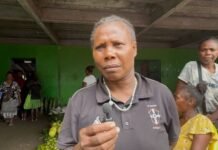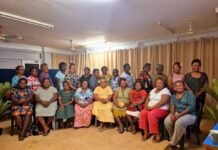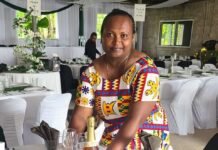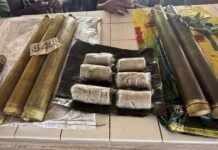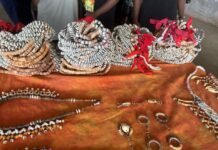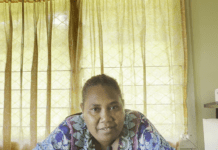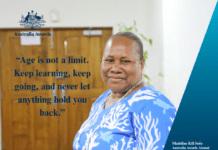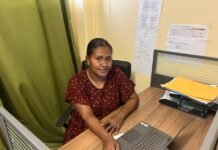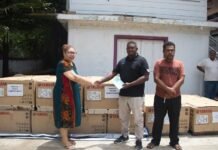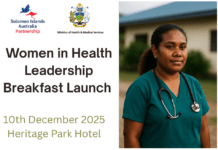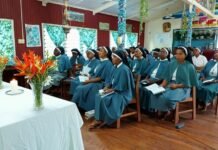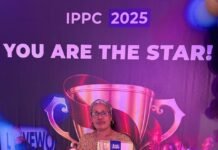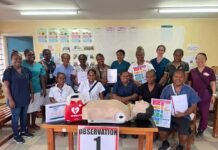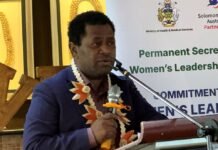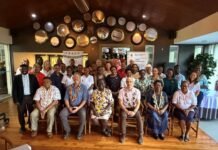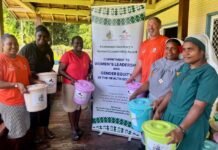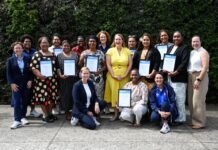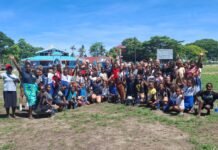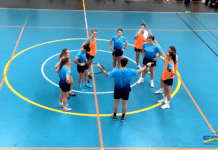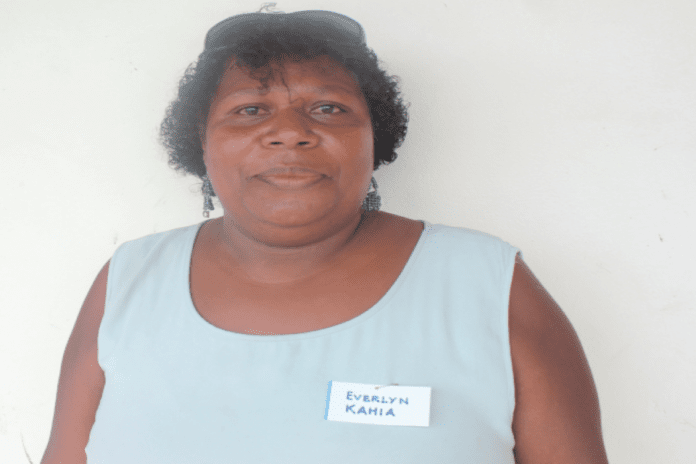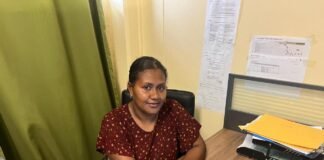BY JEFFREY TAFOLEHE
THIS week a workshop on trauma healing has been conducted for participants and caregivers who can assist in their own communities the knowledge and skills gain from this training.
The Solomon Women’s Newspaper caught up with one of the female participant for the workshop who shared her views about the training.
Solomon Women Newspaper (SWN): A brief background about yourself.
Everlyn Kahia (EK): My name is Everlyn Kahia. I am from Makira Ulawa Province. I have worked for almost 24 years with women. Now I am unemployed, however my interest with the women still continue because my first job after leaving High school is working with Women and Development Division for 10 years. With that interest working with women since I was a young girl until now that I am a grandmother nothing changes. Having left formal employment I work as a volunteer with the Makira Ulawa Provincial Council of Women to assist women to come up with some activities that can help them to promote participation of women in the community, realizing, recognizing their role in the community as well as what is expected of them. Also to work in partnership with the men to raise this new generation. Especially those who are affected like what I attended in this training here is on trauma counselling. And from experience working with the people down in the community, this is an area which needs more attention, commitment and dedication of people who consider themselves as leaders to serve in the province. This is what I personally feel and I like to share.
SWN: What is the very important thing about the workshop?
EK: This is a very important workshop. I have never attended such workshop before and until today this is my first time to attend such training. By listening to the theme of this workshop, ‘mending the broken heart’ I see this as very important. Trauma counselling is one area our leaders need to address. They need to address that area. For example, when we try to make reconciliation using money that is a wrong approach because we are not actually healing the root of the tree. We are only trying to address the top. Trauma counselling and this training I attended now I see as very important because you actually go to heal the wound in the heart. So in order for a person to accept reconciliation, you have to touch the person’s heart first. So I see this training as very important because as a women leader in my province I want to address this. I have raise this yesterday during the opening. Out of the all the participant I have talked to a great length. I pointed out to them the importance of this training to go down to the provinces. It’s enough for Honiara. It’s really important the Ministry of Peace and Reconciliation must get this type of training down to the provinces. We have women victims of domestic violence, children, mothers or family breakups and the list goes on. Other areas such as sexual abuse, incest; these problems exist inside our communities and victims are traumatized for life. Therefore people like us who have these skills, knowledge we really need to get down and assist them and this is the way forward. If the Government of the day creates a Ministry of Peace and Reconciliation, it should be really serious about this program going down to the people because I for one only believe this is the way we can do reconciliation or we can do this kind of trauma counselling assisting people. Before we can settle it up there, I don’t believe in reconciling using chupu, tafuliae or whatever red money. These things are ok but do this first so that we heal the wound in the heart before doing material form of reconciliation. That’s what I believe on.
SWN: What does this workshop mean to you (reflection)?
EK: What we covered yesterday and part of today which I am deeply touched is I must heal first in order to be able to assist another victim or another person who has the trauma as well. Another reason as a single mother I have faced similar issues as these; I feel it is really important that I must be healed first before I can help another person. However looking at these tools learn this week, I really believe in a transformed person first otherwise if you are not transform you will transfer the problem you have to the next generation or you will transfer it into the community. So you have to transform first. Change yourself first. What I really appreciate about this training is I must be healed before I can heal another person. Humility is also important as well. If I’m not humble, I cannot assist another person so as a leader, humility first and foremost I must have it. But above all this, God must live in me first. So that is why I have to transform first.
SWN: What is the title of the Holy Spirit?
EK: The counselor because what we have gone through is trauma counselling. But if I am trained in trauma counselling then I won’t allow the Holy Spirit the best counsellor and then my training here is a waste of time. The first person I need to put first here is the Holy Spirit because He is the best counsellor. He will show me all the hidden things.
SWN: What is the best advice you received in the workshop and you wish to pass on to our readers?
EK: Firstly it is transformation. Secondly I must be the first to be healed in order for me to help other people to be healed. I must be an example to the people so having going through the experiences in life is another thing where I can be able to assist another person. For example, if I am not a single mother, I will not be able to assist another single mother when she faces the same situation. If I am a counselor, it’s good to experience it too because if you do not, sometimes your advise won’t be helpful because you are not a victim. You are not traumatized, you don’t experience the pain, therefore sometimes the advises you give is a wrong advise. So I see this workshop as very important so when I speak, I speak my testimony of what I have come through in my life so it could help another person’s life. It’s actually what I experience and feel; it’s not hearsay.
SWN: What are some recommendations you would like to give concern this area in workshop?
EK: In my personal view, people attending such trainings I would like in future to have couples attend such trainings. Also to take both male and female victims to go through this training and from this experience they can go out and assist others who have gone through similar problems at their level as well. Those of us attending this training to go out and preach what we have learnt or put action plans and work with whatever community you represent. I for one as a representative of the Makira council of Women will go back and teach what I have learnt and I’m optimistic because we are yet to hold our annual general meeting and when we do, we will be able to draw up our annual work plan and budget. Therefore attending this training will be really helpful for me to contribute some of the things learn here to put into action plan and help to facilitate to educate women in my province. Also I talked to the Priest in my Province and he is happy that I attend this training on trauma counselling. They are looking forward to hear from us the things learn in this training to pass on to our mother’s Union. Also Provincial Police Constable (PPC) from Makira is excited that me and my colleague attend this training and will be able to go back and train them, especially their correction officers to train their inmates with this knowledge. Also our Premier is looking forward to hear from us on the things learn in this workshop.
SWN: What is your number one goal you plan to achieve with the knowledge gained from the training?
EK: After this training I will gather all the women leaders, executive and women leaders in the council of women to come together and I will brief them about this program. I would like us to move on even with any funds we have. We could organize a half day meeting in Kirakira just to get things going. We can call every women leader in every church to come together and pass on this information then I can listen for feedbacks. If my women leaders agree with this program, then we can submit a proposal to the Provincial Government to assist us because I am aware Makira Provincial Government allocates funds that can support us. So we can tap from the Provincial Government to assist us to disseminate this information gain from the training. Secondly I want this program to be part of our annual work plan for Makira Ulawa council of Women where we can go down to ward councils of women. I whole heartedly believe that this is the right approach and the way forward to address these issues because it’s dealing with human beings and the heart. Before coming out to address the tree’s branches, we need to deal with the root first.
SWN: Is there anything you wish to share with our readers who might wish to get into such workshop?
EK: I see this training as the way forward in order for people like us who regard ourselves as a leader I have to empty myself first then fill myself up with good things where I can help to bring up peace inside the community. Seeing that we have experience crisis inside our country and it’s not only a national crisis but a family crisis; we have community crisis. We have problems there so I see this as very important that we as leaders have to take on board such training to help us to work together to help the National Government according to their acts and policies in terms of reconciliation and peace. So I want women leaders, church leaders, chiefs and those who held title as a leader in the community must take this knowledge as well to help him to carry his/her responsibility in different areas one is mandated by the people to perform. Also I want to stress that members of Parliament also need this training. They need to understand that being up there and not aware about issues people are facing at the lower level, they will not know how to address these issues. We need our national leaders to equip to enable them and enlighten them to see and legislate accordingly, because that is their primary role as members of parliament. They are there to legislate and they cannot do that when they don’t know issues affecting people’s lives.






